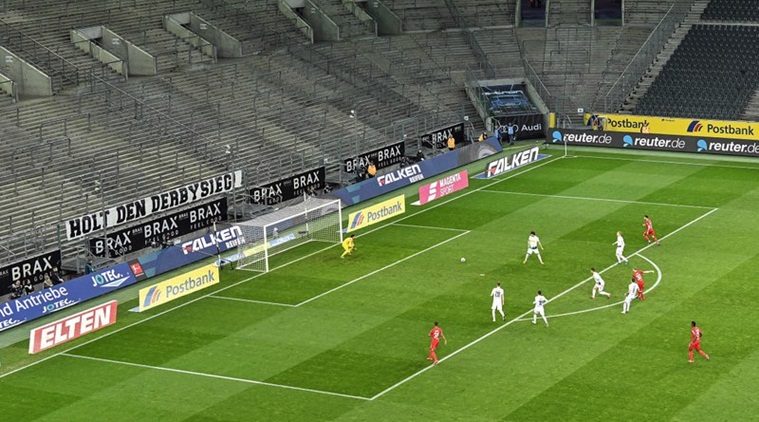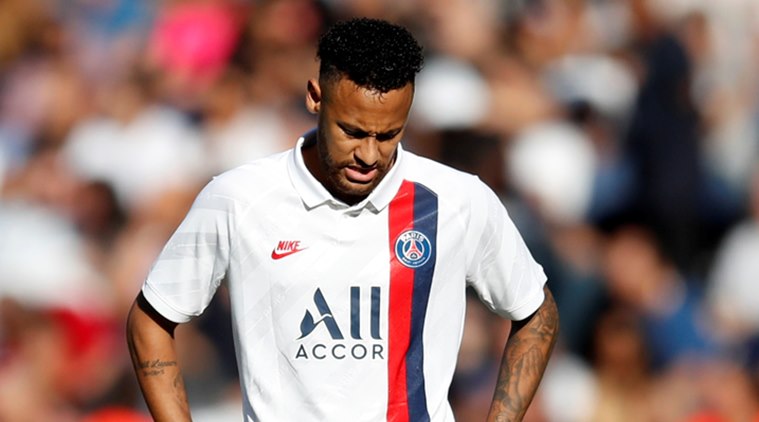 Bundesliga clubs like Bayern Munich, Borussia Dortmund have pledged to help out stricken German clubs. (Source: File Photo)
Bundesliga clubs like Bayern Munich, Borussia Dortmund have pledged to help out stricken German clubs. (Source: File Photo)
‘The 100m signings are finished’, ‘The uncertain future of the loaned’, ‘Revolucion en el futbol’ – a month back, three Spanish newspapers signalled what most of the world was preparing to face — the end of football and the economics of it as we know it. A global pandemic that forced the game to come to a standstill has now resulted in European clubs realising that their way of life could be a relic of the past.
Barcelona’s squad has agreed to a 70 percent wage reduction till the return of football. Clubs in Germany that have qualified for the Champions League – Bayern Munich, Borussia Dortmund, RB Leipzig, and Bayer Leverkusen – have pledged to help out stricken German clubs.
Players in the lower leagues of England are torn between taking a pay cut and demanding their salaries remain the same, only for the club to shut shop. As the effects of the pandemic stretch, so do the delicate finances that thread together the world of football in so many different ways.
Free agency
Most clubs in Europe will now see free agency as the best possible means of getting mid-to-top tier talent. With no large transfer fee involved, signing free agents would be all about agreeing wages, a signing-on bonus and other agent-related fees.
Cutting the transfer fee option out of the equation ends up saving the purchasing club some of their transfer budget. This would mean that players have the option to be the kings of their own future. Clubs that want to extend their contracts will have to pay top dollar and clubs that can’t afford to do so, will see their best players leave on a free.
Tottenham Hotspur player Jan Vertonghen is currently set to be a free agent and has found that the coronavirus has had a positive impact on his market. “The lockdown has brought a lot of uncertainty to the transfer market and, strangely enough, it has only had a positive effect on interest,” Vertonghen told Belgian TV channel Play Sports.
He then added, “Of course I’m free and many clubs don’t have the money to do transfers. Free players like me are even more coveted in the coronavirus crisis. But I will wait a little longer, because I really want to sign for the right club, that could also be Tottenham again… since January, a number of clubs have come forward with serious proposals. Spain and Italy are certainly options.”
Former Arsenal chief scout Steve Rowley has said that clubs will have to be more careful when it comes to scouting. “One of my managers used to tell me, ‘Scout creatively’, and that will be a buzz phrase for the foreseeable future. With travel so restricted, and with few games taking place, video analysis is going to be fundamental. It will not come as a shock to clubs in the top two divisions, because most of them are already very advanced on that side of things, but it will bring difficulties,” Rowley told the Guardian.
Player exchange deals
 Ever since the record transfer deal to Paris Saint-Germain, Neymar has been on Barcelona’s radar. (Source: File Photo)
Ever since the record transfer deal to Paris Saint-Germain, Neymar has been on Barcelona’s radar. (Source: File Photo)
Is it likely to see Barcelona attempt a multiple player swap with Paris Saint Germain in order to get Neymar back to Camp Nou? In a marketplace that has lesser and lesser sums of money but value in the form of players and their long-term contracts, it wouldn’t be out of the ordinary for clubs to rely on exchanging players without any money involved in the transaction.
Barcelona president Josep Maria Bartomeu recently said in an interview, “We predict that this transfer market will have a lot less money because of the (coronavirus) pandemic, but there will still be a lot of moves and I predict player exchange deals.”
Despite Bartomeu’s insistence that the summer transfer window will be dominated by player exchange deals, the same is a tough proposition owing to the fact that two clubs rarely agree on the valuation of a player and therefore getting an equilibrium in such a deal mostly derails it.
Youth academies
One of the major changes clubs will have to make is to look within. A KPMG football benchmark estimate suggests that developing young players and selling them for a premium in the future might be the best case option for some clubs once football resumes.
The KPMG report states that, “While players nurtured within the clubs’ youth system may be lacking in experience, they can offer a valuable alternative during such unique circumstances and, after having gained playing experience, some could also be sold at premium prices. In this regard, it is important to highlight that young footballers might also suffer from the current uncertainty; some still don’t have a professional contract, and might not even know whether they will be kept by their clubs or will have to look for alternative options.”
De-valuation
According to the KPMG Football Benchmark estimate, four billion euros might very well be the cumulative loss the big five leagues in Europe (England, Spain, Germany, Italy, and French Leagues) stand to suffer should they announce the close of their respective seasons on an immediate basis.
These valuations were made by KPMG by evaluating ten leagues (adhering to a closed system for simplicity) and the values they have assigned to players – values that are sometimes not the actual price of the player according to the transfer market. For example, Neymar was purchased by Paris Saint Germain for €222 million in 2017 but his current value according to KPMG stands at €175 million.
On the other hand, a restart and completion of the season behind closed doors leads to revenue losses of around one-third to one-fifth of the total loss estimated for a full cancellation of the season. KPMG also came up with two scenarios to go by. Scenario 1 states that the season in all ten leagues comes to an immediate end as it is. Scenario 2 states that all leagues will find a way to complete their season. In scenario 1, Neymar’s valuation falls by 21.7% to €137 million and in scenario 2, his valuation falls by 14.7% to €149 million.